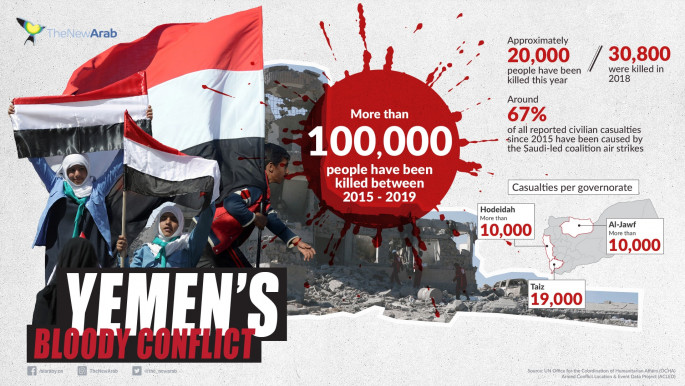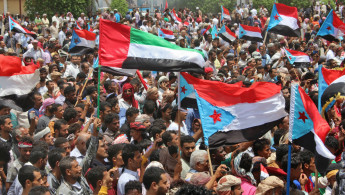Yemen in Focus: UAE-backed separatists, Saudi-backed government sign power-sharing deal ending Aden's 'mini civil war'
"This agreement will open a new period of stability in Yemen. The kingdom of Saudi Arabia stands with you," Saudi Crown Prince Mohammed bin Salman said at a signing ceremony in Riyadh aired on state television.
The power-sharing deal gives the UAE-backed secessionist Southern Transitional Council (STC) a number of ministries and 50 percent of posts in the country’s cabinet, after years of discontentment in the south.
Saudi Arabia's Al-Ekhbariya state television reported a government of 24 ministers would be formed, "divided equally between the southern and northern provinces of Yemen”.
In doing so, the deal will see the fringe STC officially fall into the fold of the Saudi-led coalition waging war in Yemen.
STC forces, which have for several years been trained by the UAE in the south and have on multiple occasions fought Saudi-backed government forces, will be brought under the government’s wing.
The deal will also see the government return to the main southern city of Aden to "reactivate state institutions" in the temporary capital, though Yemen’s President Abedrabbo Mansour Hadi will remain in Riyadh.
The "Riyadh Agreement" signing ceremony took place in Saudi Arabia on Tuesday in the presence of the Saudi crown prince and Yemen’s President Hadi, as was confirmed by Yemeni Information Minister Muammar al-Iryani who tweeted the details earlier this week.
Abu Dhabi Crown Prince Mohammed bin Zayed Al-Nahyan also attended to represent the United Arab Emirates, the main partner in the Saudi-led coalition backing Hadi's government.
The UAE-backed Security Belt Forces - dominated by the STC - in August took control of Aden, which had served as the beleaguered government's base since it was ousted from the capital Sanaa by Iran-backed Houthi rebels in 2014.
Twitter Post
|
Read more: Yemen in Focus: UAE wants its $100 million Aden power station back
The clashes between the separatists and unionist supporters of the government, who for years fought on the same side against the Houthis, had raised fears the country could break apart entirely.
The separatists - who seek renewed independence for the south, which was ruled by a separate state until 1990 - have received arms and training from the UAE.
Abu Dhabi accuses Hadi's government of allowing Islamist elements to gain influence within its ranks.
In recent weeks the government and the separatists have been holding indirect talks mediated by Saudi Arabia in the kingdom's western city of Jeddah.
The coalition led by Saudi Arabia and the United Arab Emirates intervened in Yemen in 2015 as the Houthi rebels closed in on Aden, prompting Hadi to flee into Saudi exile.
Shocking death toll
This week, the Armed Conflict Location & Event Data Project, or ACLED, revealed Yemen's death toll rose to a shocking 100,000 since 2015.
The database project that tracks violence said approximately 20,000 people have been killed this year, already making 2019 the second-deadliest year on record after 2018, with 30,800 dead.
Saudi-led airstrikes have hit schools, hospitals and wedding parties and killed thousands of Yemeni civilians. The Houthis have used drones and missiles to attack Saudi Arabia and have targeted vessels in the Red Sea.
Civilians have suffered the most in the conflict, which has created what the United Nations says is the world's worst humanitarian crisis.
Read also: Will the Saudi-brokered deal stop UAE's meddling in Yemen's south?
ACLED said April was the most lethal month so far this year, with over 2,500 reported killed, compared to approximately 1,700 in September.
ACLED said that although the number of Saudi-led coalition airstrikes is at an all-time low, civilian fatalities from air raids have risen for the first time since the end of 2017, more than doubling in the third quarter of 2019, compared to the previous quarter, primarily due to a strike on a prison facility in Dhamar province that killed at least 130 detainees.
The group said it recorded over 19,000 people killed in the southwestern province of Taiz since 2015, making it the most violent province in Yemen, largely due to a four-year siege by the Houthis, the group said.
Hodeida and Jawf followed Taiz as the next most violent provinces, with more than 10,000 total reported killed in each region since 2015, according ACLED.
The data covers everything from airstrikes, shelling and ground battles between the various forces to militant bombings and violence at protests. But their numbers do not include those who have died in the humanitarian disasters caused by the war, particularly starvation.
The group, which receives funding in part from the United States State Department and Dutch Ministry of Foreign Affairs, builds its database on news reports from Yemeni and international media and international agencies.
Anti-UAE protests
Meanwhile, protests rocked Yemen's scenic Socotra island this week as hundreds of demonstrators rallied against the United Arab Emirates, which they accuse of occupying the island.
Chanting “no to occupation” and “out out occupiers”, the protesters marched across the UNESCO World Heritage Site’s capital Hadibo in a strong show of unity against the UAE, which has on several occasions attempted to secure its control over the island.
The protests were sparked by the UAE’s attempt to dismiss the island’s governor - a critic of the UAE’s activities in Socotra - in recent days, which began with deploying its allied forces to the government’s headquarters on the island
The UAE has recruited thousands of fighters from the separatist southern movement which have frequently clashed with government troops. In January 2018, southern separatists took control of the city of Aden, in a move that caused tension between Yemen’s government and the UAE.
Earlier this year, Yemen’s government accused the UAE of deploying its troops on the archipelago during a visit by Prime Minister Ahmed Bin Daghr.
Read more: Comment: Why is UAE 'occupying' Yemen's Socotra island?
Last year the government accused the UAE of seizing the island when it unloaded tanks and troops there. Saudi Arabia, leader of the pro-Hadi Arab coalition, had to send troops to Socotra to defuse a standoff between Emirati and Hadi forces.
In May, Yemen's interior minister criticised the UAE and said it should concentrate on fighting the Houthis instead.
"I think our partnership with the coalition is the war against the Houthis and not sharing the administrations of the liberated territories," Ahmed al-Mayssari said in comments broadcast by Yemeni television channels at the time.
The UAE has denied Yemeni accusations that it is seeking control of the island.
Sudan's heavy losses
Meanwhile on the Houthi front, the rebels this week revealed more than 4,000 Sudanese soldiers fighting with the Saudi-led coalition in Yemen have been killed.
The military alliance intervened in 2015, months after the Houthi rebels captured control of the Sanaa and other major cities, forcing the government to flee to Aden before then exiling in Riyadh.
“The Sudanese regime forces its soldiers to fight as mercenaries in return for money within the ranks of the aggressor coalition forces,” Yahia Sarea, Houthi military spokesman said in a press conference.
“Other states limited their role to joining airstrikes or naval forces but the Sudanese regime threw its soldiers to ground warfare, where many of the coalition stated refrained” he said.
The comments were broadcast alongside footage purportedly showing captured Sudanese soldiers, as well as arms and ammunition belonging to coalition forces. Interviews with captives suggested they were “being treated well by our Yemeni brothers” while some slammed the Saudi-led coalition for negligence, saying they “pulled out and stabbed us in the back”.
Sudanese opposition figures have called on their country's transitional government to bring back Sudanese soldiers fighting for the Saudi-led coalition in Yemen, including child soldiers and mercenaries, according to a report published last month.
Spokesman for the Sudanese Professionals Association, El Rashid Saeed urged the country's new government to work towards ending the war in Yemen and bring Sudanese troops back home.
"We do not want the war to continue in Yemen," said Saeed in a press conference. "We want the talks to go on according to the plan prepared by the United Nations.
"I think Sudan can play a role in this regard through giving an ultimatum to its allies in the Arab coalition, for the sake of the peaceful solution that will guarantee the withdrawal of our forces without harming the relations with other countries."
At any time in the past four and a half years, as many as 14,000 Sudanese militiamen were fighting in Yemen with local militia aligned with the Saudis, according to an Al Jazeera report. Many of these, the report adds, were children and mercenaries.
There are "between 8,000 and 14,000 Sudanese paramilitary forces are fighting in Yemen", Noha Aboueldahab, from Brookings Doha Centre, told Al Jazeera.
"Sudanese mercenaries, many of them children from Darfur, have been lured into fighting on the ground in Yemen in exchange for financial compensation."
The decision to join the Saudi-led war against Houthis in Yemen was made by former dictator Omar al-Bashir, whose current trial revealed he received millions in illicit cash funds from Saudi Crown Prince Mohammed bin Salman.
In December, The New York Times reported that Riyadh offered impoverished Sudanese families up to $10,000 to send their children to fight in Yemen.
"Families know that the only way their lives will change is if their sons join the war and bring them back money," the New York Times quoted one Sudanese child soldier as saying.
The report said that children made up at least 20 percent - and sometimes 40 percent - of the Sudanese battalion in Yemen.
Many had been brought in from the Darfur region of the west of Sudan, where some 300,000 people were killed and 1.2 million displaced during years of conflict. Saudi Arabia denied the reports earlier this year.
But despite the preogressive calls from a new Sudan, analysts believe the move is yet to be imposed.
"It is unlikely that anything will happen regarding a possible withdrawal of Sudanese soldiers from the Yemen conflict considering the transitional government is civilian-led and the armed forces are included within the council that came as a result of the agreement between the Sudanese opposition and the military," Yemen expert Mohammed al-Jaberi told The New Arab in October.
"The final say lies with the council itself and not the government and considering the strong connection between Hamiditi and Saudi Arabia and the UAE, it is unlikely for Sudanese forces to withdraw," he added.
"This is another clear example of the differences between the true powers that exist - the civil versus military."
It is estimated that hundreds of Sudanese have been killed in fighting in Yemen, in a conflict that has affected ordinary civilians as well as those from the highest ranks, among whom was the brother Houthi rebel chief Abdelmalik al-Houthi.
Sana Uqba is a journalist at The New Arab.
Follow her on Twitter: @Sanasiino
Yemen In Focus is a new, regular feature from The New Arab.



